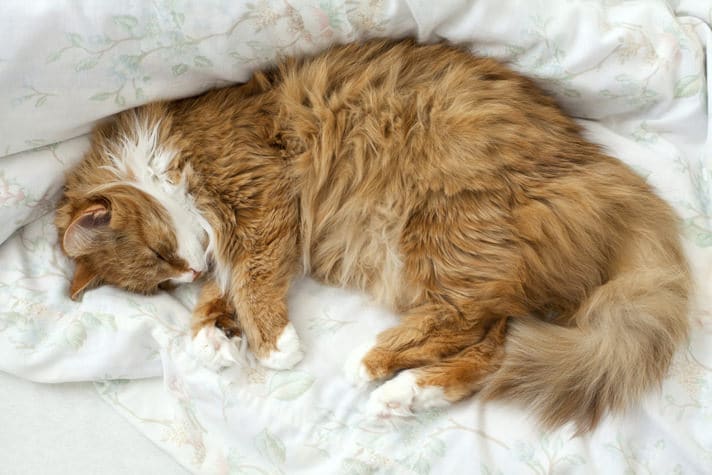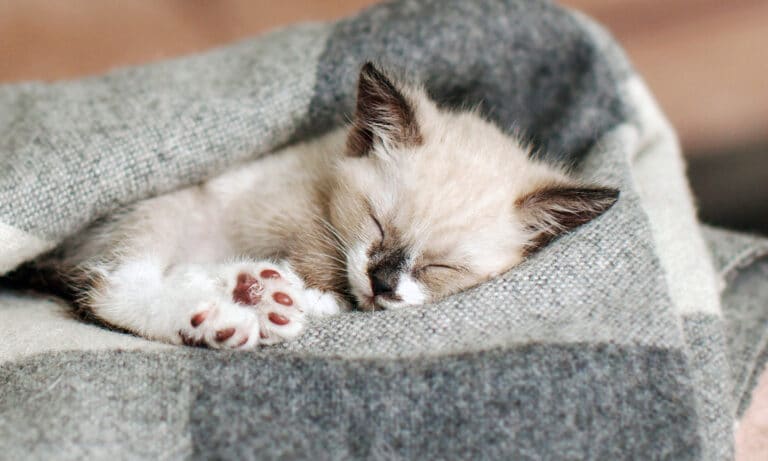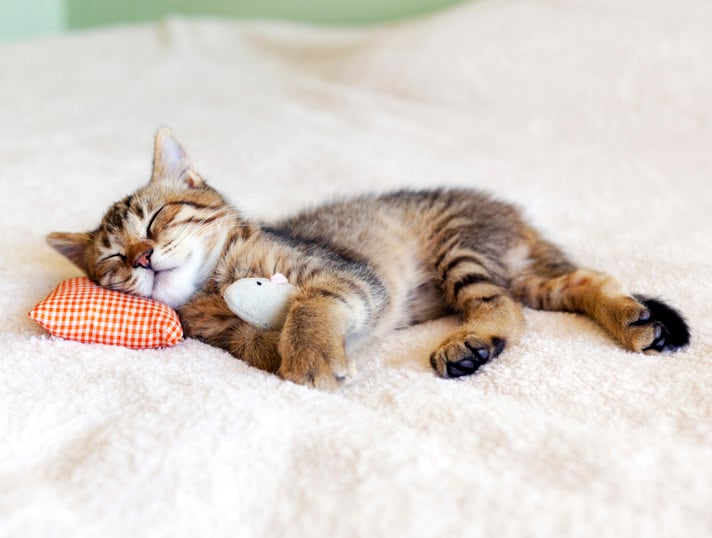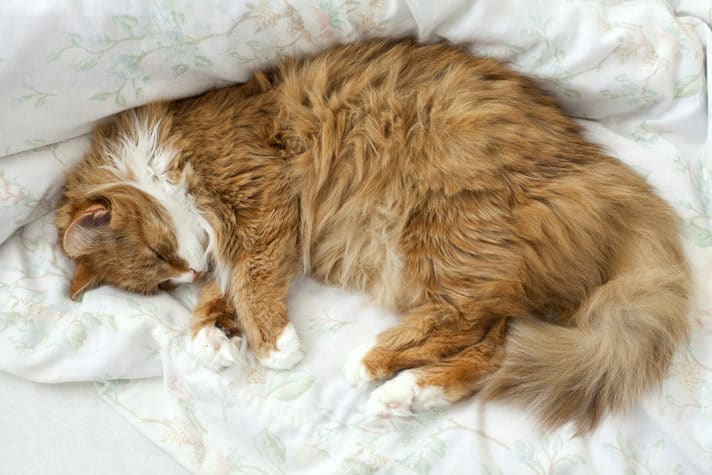Cats have a well-deserved reputation of enjoying their slumber (and plenty of it), but if you share your home with a continuously snoozing cat, you may wonder how much should an adult cat actually sleep. Read on to learn about cat sleeping patterns and how to easily tackle cat sleeping problems.
What Goes on During Those Catnaps
While younger cats and kittens require close to 20 hours or more a day of sleep, adult cats 3 to 10 years in age average around 13 to 16 hours of sleep a day. Of course this is an average, and just as there are people who need more or less beauty sleep, some felines will snooze less and others more.
To help understand the cat sleep cycle, remember that while we humans sleep long stretches at once, cats coined the term “catnap,” and it’s not without reason. You see, cats don’t really sleep eight-hour sessions like us. Throughout each 24-hour period, they will cycle in and out of naps, rotating through light, then deep sleep, then light again.
Ever see your cat’s whiskers moving and eyelids twitch? This is the light stage of sleep, and you guessed it; she is dreaming. While she is dozing, a cat’s senses remain finely tuned and she can jump out of bed and be alert far quicker than most of us can when an alarm goes off. If your kitty realizes there is no danger, she can fall back asleep just as quickly as she awoke.
Why Cats Sleep So Much
You may have heard that cats are nocturnal, but this is a misnomer. Cats are actually most active at sundown and daybreak (which explains those early morning paws on your face), but as soon as you are out the door and off to work, your cat settles down for a restful day of catnaps. This sleep pattern isn’t one your pampered house cat adopted to annoy you; cats tend to retreat and lay low during the dark night hours and day time as well, when other predators are out and about, leaving dawn and twilight for prime hunting time.
Cats’ diets also play a role in their sleep patterns. Predators hunt, then eat, then sleep. One meal can satiate them for a lengthy period of time, as prey is a much more substantial energy source than vegetation. And while a successful hunt ensures far more food, chasing and capturing your dinner is much harder work than nibbling on leaves or grass. Once a big cat’s needs for hunting, mating and socializing are met, being awake and active for no reason is a pointless expenditure of precious calories. Cats have evolved to conserve the remainder of the hours of the day in the most efficient way possible — through sleep.
Cat Sleeping Problems
While excessive sleeping in kittens is rarely a concern, if you notice your adult cat is sleep more, it may indicate a medical concern. Adulthood is when many feline diseases begin slowly developing, such as chronic kidney disease, but any single illness can cause a cat to retreat and spend more hours snoozing. Excessive sleeping in an adult cat can also be a sign of pain, such as arthritis.
On the opposite end of the sleep spectrum, if your adult cat seems to have endless energy and is sleeping less, this may be a sign of a medical problem such as hyperthyroidism. Hyperthyroidism is a relatively common endocrine disease of middle- and older-aged cats in which the thyroid gland produces excessive thyroid hormone. Among other clinical signs such as weight loss, diarrhea and/or vomiting, increased appetite and thirst, hyperthyroidism can cause hyperactivity. This restlessness can affect a cat’s sleeping cycle and prevent her from logging all the catnaps she need, but treatment is only a vet visit away.
Improve Your Cat’s Sleep Habits
By the time your cat is an official and mature adult, hopefully she will have acclimated her sleeping habits to be somewhat parallel with your own. If she is, however, still waking you frequently at night, there are many things you can do to help improve her sleeping.
1. Stick to a schedule. If you have ever travelled or moved with a cat, you know cats are creatures of habit that enjoy routine and predictability. As much as you can, try to keep your weekday and weekend bedtimes and wake times somewhat consistent.
2. Schedule play sessions during the day. Interactive games with you are great for zapping her energy; if you aren’t at home during the day, consider a cat treat toy, a cat puzzle toy, an engaging window ledge overlooking a nearby bird feeder, or a cat sitter to come over for a play session. Here are seven tips to keep your cat from getting bored.
3. Feed her before bedtime. Cats sleep best after a big meal so consider feeding her dinner meal right before your bedtime. If you free-feed her, be sure she has access to her cat food at night as some night wakings may simply be due to hunger.
4. Provide a safe quiet place to sleep. Whether this is snuggled next to you under the blankets or in another room with her own cat bed, a cozy place to rest will help her sleep at night.
5. Withhold attention. Unless you suspect your cat is ill or injured, don’t give her the attention she seeks. If you interact with her after she meows and starts chewing on your hair at 2 a.m., she has achieved her goal. Each time you respond in the middle of the night, it trains her to keep this pattern up on subsequent nights.
Share:









